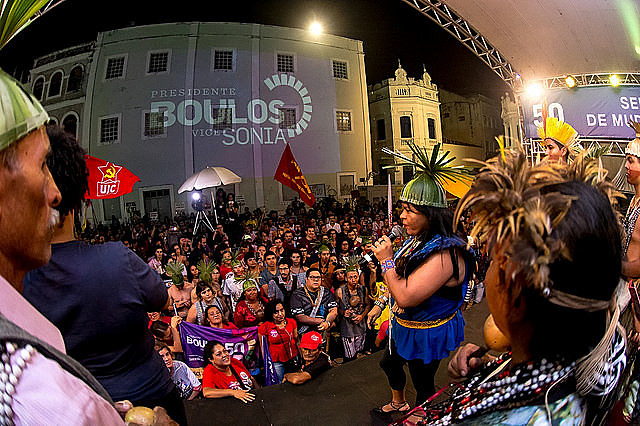The setbacks suffered in the Michel Temer administration and the struggle for land demarcation have led to more indigenous leaders to take part in political spaces.
The number of indigenous candidates running in this year’s elections in Brazil is larger than the previous elections. According to the Supreme Electoral Court (TSE), 74 of the 85 candidates registered to run in the 2014 elections who identify as indigenous had their registration approved. This year, the top electoral court received 129 registrations of indigenous candidates.
Brazil's Association of Indigenous Peoples (APIB) estimates that 75 indigenous activists were appointed to run for local, state and federal legislative seats, as well as for governors and one vice president – Sônia Guajajara, running for the Socialism and Freedom Party (PSOL).
According to Luiz Eloy Terena, a legal advisor with the APIB, the country’s political scenario has raised a “collective awareness among indigenous leaders that they need to occupy the institutions.”
“We have a political scenario that allows us to understand how necessary it is to have indigenous people whether in state or federal parliament. And this became very clear as we faced the coup, so much so that last year and this year we were able to set the two biggest indigenous camps ever – we’ve gathered 4,000 indigenous leaders in Brasília to challenge the setbacks to rights,” Terena said.
The first and last indigenous representative in the country’s Chamber of Deputies was chief Mário Juruna, a Xavante activist, between 1983 and 1986.
Luiz Terena says that challenging the influential rural caucus is a key concern for the movement, and having indigenous representatives in parliament is a way to defend indigenous peoples’ rights, as they are being debated and attacked by lawmakers.
Violations
According to a report by the Missionary Council for Indigenous Peoples (CIMI), violations against first peoples increased since 2016, the year when “a coup staged by political, judicial, and media forces led Michel Temer to take over the presidency.”
Temer signed a decree this year ratifying the Indigenous Land Baía dos Guató, for the Guató people, in the state of Mato Grosso, during the week when the 15th Free Land Camp was being held in Brasília. Nevertheless, he is the president with the worst performance in terms of demarcation of indigenous lands.
The CIMI report shows there are 530 areas claimed by indigenous peoples that are still overlooked by the Temer administration, including 53 areas recognized by the National Indian Foundation (FUNAI) that are pending a declaratory ordinance by the Ministry of Justice, while 62 are pending ratification by the president.
Women
Indigenous women are also taking a political stand. Telma Taurepang is running for Senate and says that women’s political participation inside parties is new. “We need to advance on this matter, for indigenous women to take over these spaces, local, state, and federal legislative houses, and even running for president,” she said.
Eunice Kerexu, a Guarani Mbya woman, is running for congressional office and says that the attacks against the indigenous people in her community in Santa Catarina, southern Brazil, have intensified and became more cruel since 2017.
In November last year, her mother was tortured and had her hand cut off. Her family reported the crime, but to this day they have not been granted access to the results of the investigation. Crimes against the Guarani Mbya people and her community’s struggle to have their territory recognized have encouraged her to run.
“After this attack I realized that it’s the politicians who are in charge of the law, because the attacks are coming from the police. It’s the politicians who lead these attacks here in [the city of] Palhoça, especially the city council. They hold sessions and hearings against the indigenous people who live here, so entering politics for me is about defending the territory, and especially about exposing these attacks and publicizing our struggle,” Kerexu said.
In this year’s elections, 45 of the 129 indigenous candidates who registered to run are women.




